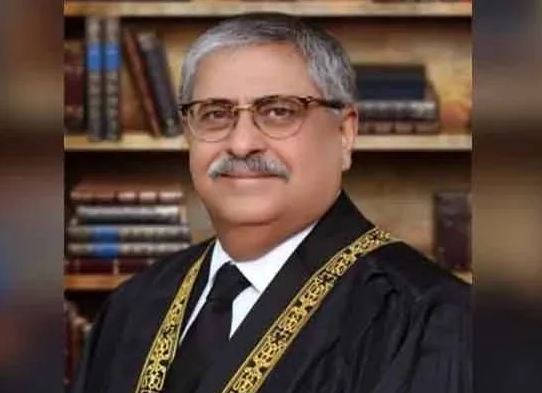ISLAMABAD: Supreme Court Justice Athar Minallah has maintained that live streaming the court appearances of Pakistan Tehreek-e-Insaf (PTI) founder Imran Khan in the NAB amendment case is not against the laws as there is “no substantive reason” to deny public the right to have access to court proceedings.
The apex court judge stated this in a dissenting note issued on Wednesday on the Khyber Pakhtunkhwa government’s petition seeking live streaming of the hearing of the National Accountability Bureau (NAB) amendment case.
Last week, the Supreme Court in a detailed verdict stated that broadcasting of the court proceedings of cases involving politicians can be used for political “point-scoring”. Justice Minallah however, disagreed with the majority 4-1 judgment.

It may be noted that an investigation was launched by the SC administration after an image of the former prime minister, attending a the NAB amendments case hearing last month, was released by PTI.
Khan has been incarcerated in Rawalpindi’s Adiala Jail since August last year after he was sentenced in Toshakhana case. Despite being granted relief in several cases he was booked in after his ouster from power in April 2022, the PTI founder remains behind bars owing to his conviction in iddat case.
In his dissenting note comprising 13 pages, the justice said that there was no substantive reason nor exceptional circumstances to deny the public their right to have access to court proceedings through live streaming.
He said that the deposed prime minister was the founder and undisputed leader of a major political party — the PTI.
Citing the principles enunciated by a larger bench of the apex court, the judge stated that the public has a fundamental right under Article 19-A of the Constitution to have access to information in its original jurisdiction under Article 184(3) of the Constitution, including the right to know and see how court proceedings in these cases are conducted by the court.
“It becomes inevitable for this court to walk the extra mile to ensure transparency and enforcement of the guaranteed right under Article 19-A of the Constitution by giving access to the public to the court proceedings through live streaming,” Justice Minallah stated, adding that the denial of access to the court proceedings will unjustifiably give rise to suspicions and erode the confidence of the people in this court.
“It is an obligation for this court to be seen as impartial, fair and independent and to dispel any perception to the contrary. The trust of the people will be maintained and promoted by enabling them to know and see for themselves the court proceedings,” he stated.
Moreover, Justice Minallah said that the all the cases heard under Article 184(3) had been live streamed after the successful execution of a pilot project regarding the live streaming of cases.
“[…] denial of this guaranteed right will amount to violating the principles laid down in the Justice Qazi Faez Isa case,” the note read.
In its detailed verdict, the apex court had said in reference to Khan that when the head of a political party wants to be heard, who is not an advocate of this court, there is a real probability that these hearings may be used for political purposes and point-scoring and in respect of matters which do not concern these appeals.

















